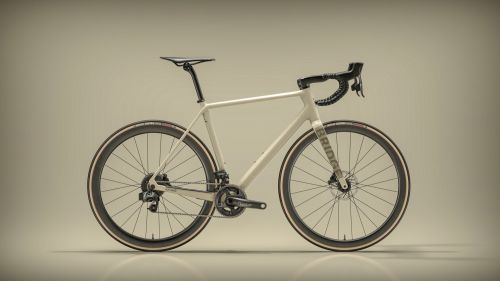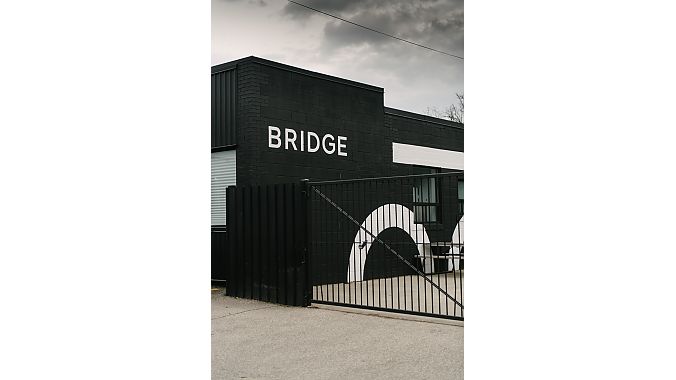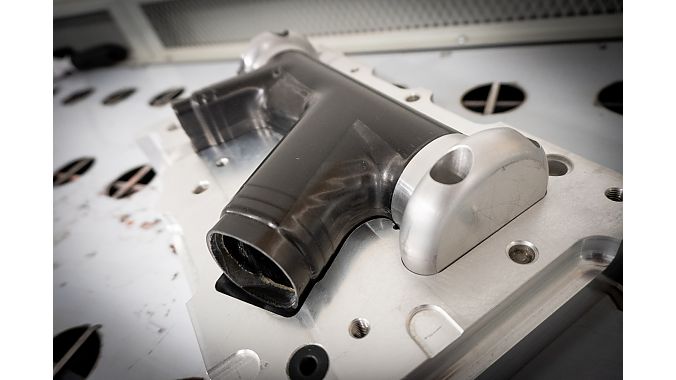TORONTO (BRAIN) — When collaborating on a new brand, Michael Yakubowicz and Frank Gairdner didn't just want to build a bike. They wanted to create the entire manufacturing process from pencil to paint under one roof.
Bridge Bike Works is the result, a brand three years in the making and built to design and manufacture carbon fiber frames, forks, and parts in North America. Its 8,200-square-foot facility — 2,000 of which is set aside for showroom and office space — is in Toronto, with the first pre-production prototype completed this week for testing. Production bikes are expected by August, with 60 pre-orders filled.
Bridge also has ambitions to begin OEM carbon fiber production.
Yakubowicz, owner of Blacksmith Cycle in Toronto, and Gairdner, an experienced entrepreneur in manufacturing sporting goods in North America, share a passion for the sport and formed a partnership to build a brand that won't chase every manufacturing trend while hoping to appeal to the grassroots cyclist.
"I think that's maybe what makes us unique because we're not driven by marketing decisions but instead a focus on building the best product possible," Yakubowicz said. "Pretty much everyone who has their hands on our process has deep experience in the cycling industry."
For example, of the eight full-time employees, Bridge attracted two engineers formerly from Cervelo. Just don't call it a boutique brand.
"We're trying to compete, price-point-wise, with those bigger brands," Yakubowicz said. "For us, it was all about investing in the people, the engineering, and focusing the product on our customers, which means that we're not trying to be a brand trying to sponsor a pro race team, and then convince people that that's the bike they should ride. We're designing an all-road bike for the enthusiast."
That first model, the Surveyor, is designed around road geometry but with clearances for up to 40mm all-road tires. "We really worked on the engineering to ensure maximum tire clearance with as kind of racy and performance-oriented a geometry as we could design," he said. "So the idea is it's kind of your N+1 killer. We think this is a really versatile road and light gravel bike that potentially with two sets of wheels you could do 90% of your riding on."
What you won't find is an integrated wedge seatpost clamp or press-fit bottom bracket. While the brand opts for an oversized D-shaped downtube and integrated cables, it utilizes a standard 27.2mm seat collar and threaded T-47 bottom bracket.
MSRP for the frameset — which includes a Bridge Bike Works fork, seat collar, and front derailleur clamp, plus thru-axles, and headset — is $4,000 USD. Complete builds will start at about $6,250 USD.
Opting to manufacture domestically was the plan from the beginning, Yakubowicz said, a strategy that was especially timely because of supply-chain issues affecting the industry for the past two years.
"We started this project pre-COVID and always intended that the bike would be domestically built. In terms of investing in people and community and really the quality of the product, doing it locally was the best way to do that."
Bridge successfully raised initial funding for the project primarily through the Ovare Group, based in California, and Digsbury Ventures, based in Washington, as well as private investors. While fundraising is still ongoing, Bridge already has secured necessary funds to drive its initial Surveyor model through to production later this summer.
Yakubowicz said the company has had no problem securing raw materials and sourced carbon from North American manufacturers. In under a year, it has outfitted its facility with CNC mills, cutting tables, presses, ovens, an autoclave, and all the rest of the machinery needed for its processes. Bridge also has in-house 3D printing capabilities
"That allows us to be really agile and quick in terms of our design and iterations, but it also means if we want to cut a new tool, we don't have to outsource it and wait four weeks for it. We just design it, cut it in two days and start working."
Like all brands, getting components has been more challenging, but "we're actually in a very good place in terms of available groups, and our online build configurator for the public is linked to inventory that we either have in stock or what we've got actual estimated shipping dates on," Yakubowicz said. "That configurator is meant to be able to build complete bikes that will ship before the end of the year."
While social and environmental reasons were obvious, Yakubowicz added that having complete control of the manufacturing process will benefit the consumer most of all.
"We think people are more aware of where their products are being made and how lead times have been affected," he said. "So even in terms of delivery times, doing it locally means that once we're up to production, we're aiming to be delivering framesets or built bikes in a matter of weeks, as opposed to many months or even years, which you're seeing from a lot of the bigger bike brands."
Bridge's facility is leased for five years, at which point it will be determined if a bigger space is needed, Yakubowicz said. And it might be if the OEM business side takes off. Yakubowicz said Bridge has the capability to produce carbon fiber bike components.
"We've had some conversations about potential OE production for other brands, framesets or components. But our thinking is we'll likely expand in the future into producing for other companies as well. We're entirely carbon focused. Essentially, building hollow carbon parts is what we've designed this facility to do."
With his background, Yakubowicz naturally is partial to the retailer, and building a dealer network for the Surveyor — which likely will be joined by a more gravel-focused model in 2024 — already is underway. About a dozen dealers from North America and internationally have been secured. Consumer-to-direct also will be another sales channel.
"Our consumer-direct sales really are aimed for people who don't have local dealers," Yakubowicz said. "But in terms of our dealer network, we're going to refer as many local sales to those dealers as possible. I mean, I'm obviously biased because I own a bike shop and a big believer that a good local bike shop is still the best place to buy a bike. We would be excited if dealers were looking to reach out and find out more about the brand."
He expects first-year sales will be skewed more toward consumer-direct.
"But as we grow, our preference is that every year our dealer sales will take up a bigger chunk. You know, if I had my way in five years, I would rather have 100 dealers selling 10 or 15 bikes each a year than trying to sell 1,500 bikes consumer-direct a year."






